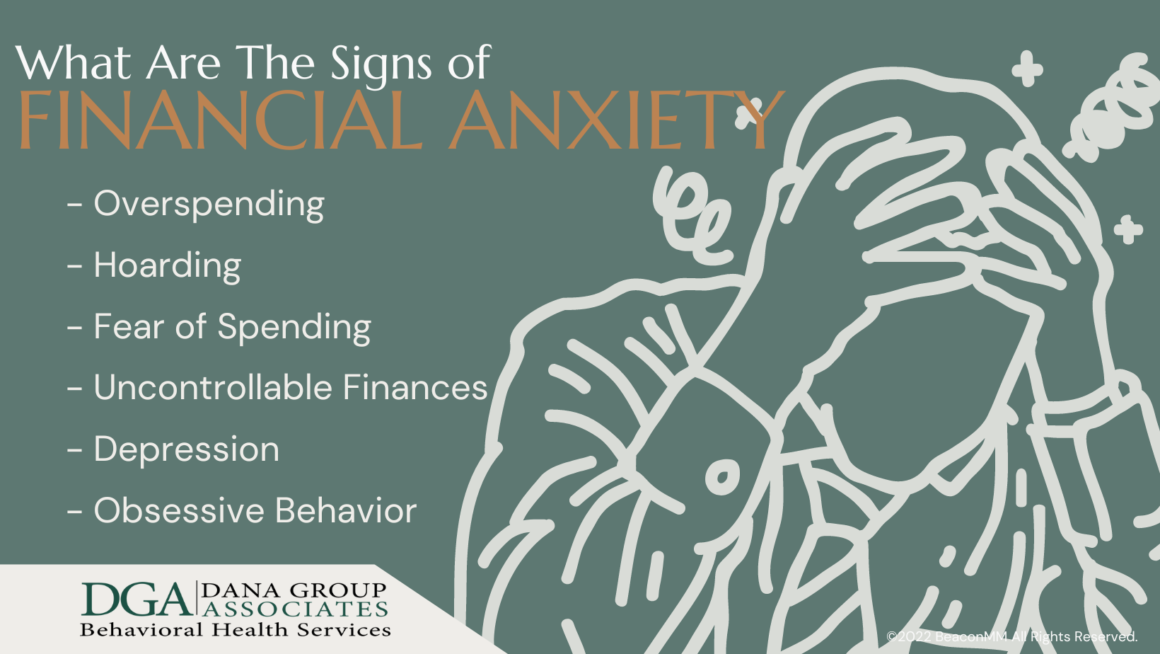Money can often be the root cause of your stress. You may be worried about how you’ll be able to make upcoming payments or are unsure how the market will affect your state of living. This stress can affect many aspects of your life and make it difficult to focus on work or other priorities, leading to more stress.
So, you may ask yourself: how do I stop stressing about money? There are a few different things that you can do to help mitigate the stress and minimize the negative effects on your life. Here’s a guide to coping with financial anxiety and the signs that you have stress resulting from money worries.
Are you interested in receiving guidance for healthily dealing with your emotions? Contact Dana Behavioral Health to learn more!
Why May You Have Financial Anxiety?
Many people experience the worry of being financially stable at least once in their life. Some people worry more from time to time, but financial anxiety is different. Financial anxiety is an obsessive fear of money-related things that can often be debilitating.
There are many triggers of financial anxiety that may make it hard to focus on anything else and complete tasks. Those who have financial anxiety don’t just worry about having a lack of money but rather are continually worried about the following:
- Paying bills
- Looking at their bank account
- Coping with personal finances
- Experiencing a potential job loss
- Having a money misstep
- Lacking personal finance education
- Believing financial lessons from childhood
Financial anxiety can be just as unhealthy as other forms of anxiety and can often be debilitating as it affects the person’s actions and relationships with people. Many people will have the emotional side effects resulting from anxiety and may also experience physical health symptoms such as insomnia, loss of appetite, or an inability to focus.
What Are the Signs of Financial Anxiety?

Since financial anxiety can heavily affect someone’s life, it’s essential to recognize the signs of it and when it’s time to help them cope with it. It can also be helpful if you’re suffering from financial anxiety to be the one to spot the symptoms. That can help you recognize the root cause behind your stress and allow you to work on changing your mindset.
There are many symptoms correlated to anxiety that someone may experience, which can signify financial anxiety. But here are a few signs that someone may have financial anxiety:
- Overspending: Some people will spend money by shopping to temporarily relieve anxieties, which can often lead to a vicious spending cycle that worsens the problem.
- Hoarding: Sometimes overspending can often lead to hoarding, as they are taking comfort in material items to relieve the anxiety from their money challenges.
- Fear of Spending: On the other side, some people may be extremely frugal as they obsess about saving money, which can often lead to avoiding home repairs or healthcare. People who overwork to earn more often suffer from financial anxiety.
- Uncontrollable Finances: Some people with financial anxiety are worried about accumulating wealth, which can sometimes make it difficult to budget or prioritize spending, impacting things like retirement planning.
- Depression: Many people with financial anxiety can often experience depression as they may feel as though the world around them may be crashing down.
- Obsessive Behavior: Money anxiety can often cause obsessive behaviors that include constantly checking their bank account and inability to sleep.
How to Cope With Financial Anxiety
People can use many different techniques to reduce their financial anxiety. These coping mechanisms can alleviate financial stress and allow you to take control of your life. They are a combination of changing your mindset and also following habits that reinforce healthy spending habits.
You can use the following techniques to cope with financial anxiety.
Schedule Money Check-Ins
One way to stay on top of your finances is to schedule financial check-ins. You can set financial goals to save a set amount by a specific date. The check-in can ensure that you set money aside to reach your goals and have money if you ever need it.
Create a Budget
Creating a budget within your household income and expenses can ensure that you meet all financial needs while still having some money to spend on other things. You want to ensure that you fit within this budget by keeping in mind how much you’ve spent and doing check-ins with your finances.
Manage Your Debt
Debt can be one of the biggest reasons behind your financial anxiety. Having a financial plan can help you avoid debt and relieve stress. At the same time, people with debt can develop a strategy to pay it down and control their debt.
Create an Emergency Fund
Ensuring you have an emergency fund can be a great way to give yourself peace of mind. It allows you to relax knowing that if something happens, you have money saved to continue paying your bills while you recover from a sickness or lose your job. You can continue to add small amounts to your savings or leave your emergency fund untouched after your dollar amount goal.
Discard Financial Shame
One of the things that can trigger financial anxiety is the pressure to seem like you have money. Some people will compare their lifestyles or spending to others, especially on social media, which feeds into money anxieties. Spending and accumulating wealth is not a contest, so changing your mindset will help reduce the pressure to fit in with your financial status.
Practice Mindfulness
As stated previously, the techniques to reduce financial anxiety include changing mindset and behavior. To help change your mindset and mitigate your financial anxiety, you have to think about your behaviors and feelings towards personal finances to understand how you may change your pattern of behavior. Practicing mindfulness can help you be aware of your actions and emotions by doing the following:
- Questioning how you physically react to things associated with money
- Taking deep breaths to focus on destressing
- Restructuring your thinking by reminding yourself that there are things outside of your control
How Can Therapy Help Financial Anxiety?
Financial anxiety is similar to many other anxieties that one may experience. So, people can seek treatment from therapists to help them cope with their feelings and find healthy ways to work through them.
Getting help from a professional therapist can help you understand how to properly implement mindfulness in your life to decrease your financial anxieties. You should be cautious that since mindfulness is a method of self-reflection, it can sometimes increase feelings of anxiety if you’re unprepared to implement mindfulness into their life.
Seeking help from a therapist can help you prepare for these possible feelings and allow you to get help coping with them. You can receive help for identifying your financial anxiety and how to reinforce a change in mindset.
At Dana Behavioral Health, we have trained therapists who can help you recognize what techniques are right for you and help you learn how to practice healthy financial practices. We can help you improve your mental health and benefit from mindfulness practice.
Are you ready to start your journey of change? Contact Dana Behavioral Health today to get started!
